Might be imagining it! Am sure they’re both in the video with their hometowns mentioned…
27.02.2026 23:42 — 👍 0 🔁 0 💬 2 📌 0Might be imagining it! Am sure they’re both in the video with their hometowns mentioned…
27.02.2026 23:42 — 👍 0 🔁 0 💬 2 📌 0She sang on the original, no? Along with Johnny Marr?
27.02.2026 23:40 — 👍 0 🔁 0 💬 1 📌 0Not sure I’ve seen a live version of nothing but flowers before. Sent me back down a Kirsty MacColl rabbit hole…
27.02.2026 23:34 — 👍 0 🔁 0 💬 1 📌 0Remembered I’d come back to watch this….and so glad I eventually did!
27.02.2026 21:25 — 👍 0 🔁 1 💬 1 📌 0
The open access 'Journal of Critical Public Health' just releases it's third issue is now out: Competing Narratives in Decentred Health Systems -
journalhosting.ucalgary.ca/index.php/jc.... It is the only journal dedicated to 'critical public heath', community-owned (not corporate). Check it out!
Now out! Special Issue 'Competing Narratives in Decentred Health Systems', guest edited by @profkatsmith.bsky.social, Justin Waring & Mark Bevir, and PACKED with great papers from leading authors applying decentred theory to key issues in #publichealth
journalhosting.ucalgary.ca/index.php/jc...
Great to be part of this. Michael Lambert and I contributed a paper called “Articulating place: towards a conjunctural analysis of public health” on renewed interest in ‘place’ as a ‘common sense’ policy solution to improve health, wealth and wellbeing. Read for free here: miniurl.com/k85lq8iu
23.01.2026 18:50 — 👍 3 🔁 2 💬 0 📌 0
Palestine Action-linked Qesser Zuhrah taken to hospital after a 46 day hunger strike - Qesser will have spent over a year in jail with no trial despite the pre-trial custody limit being 6 months www.theguardian.com/uk-news/2025...
17.12.2025 19:54 — 👍 3 🔁 4 💬 1 📌 0
Ongoing decimation of British universities part 252:
Apx. 1000 academic staff at University of Essex just received formal ‘risk of redundancy’ letters via email.
Please share @ucuessex.bsky.social @ucu.org.uk
I know this is hardly a new problem in academia, but....£620!?!
05.12.2025 23:12 — 👍 1 🔁 0 💬 1 📌 0
'Repairing epistemic injustice and loss in the era of climate coloniality'
Important new paper from Farhana Sultana
rgs-ibg.onlinelibrary.wiley.com/doi/10.1002/...
This Friday lunchtime, we're giving a talk on the 'Stories-so-far: Doreen Massey archive project'. We'll say a little about what we're doing, why, before opening up a conversation around how we might keep thinking with Massey in this conjuncture. Open to all, just sign up below:
12.11.2025 15:49 — 👍 1 🔁 0 💬 0 📌 0
Sultana draws on documentary video content from the 'Voices from the Global South' project, produced by the Open University, @rgsibg.bsky.social & @igu-ugi.bsky.social, to illustrate the arguments in her paper.
rgs-ibg.onlinelibrary.wiley.com/doi/10.1002/...

📣 Next GCSJ Seminar
🗓️ Fri 14 Nov 2025 | 12–1PM | online
🔎Rearticulating archives: still thinking with Doreen Massey — exploring how Doreen Massey’s archive invites new questions about our troubled present.
Register to join the critical and creative dialogue: www.eventbrite.co.uk/e/rearticula...

As an alumni of Syracuse University, it's appalling that they are capitulating against a right-wing campaign against Professor Farhana Sultana for exercising her first amendment rights. Do consider signing this letter calling on Syracuse University to reinstate her docs.google.com/forms/d/e/1F...
29.10.2025 21:08 — 👍 129 🔁 79 💬 8 📌 8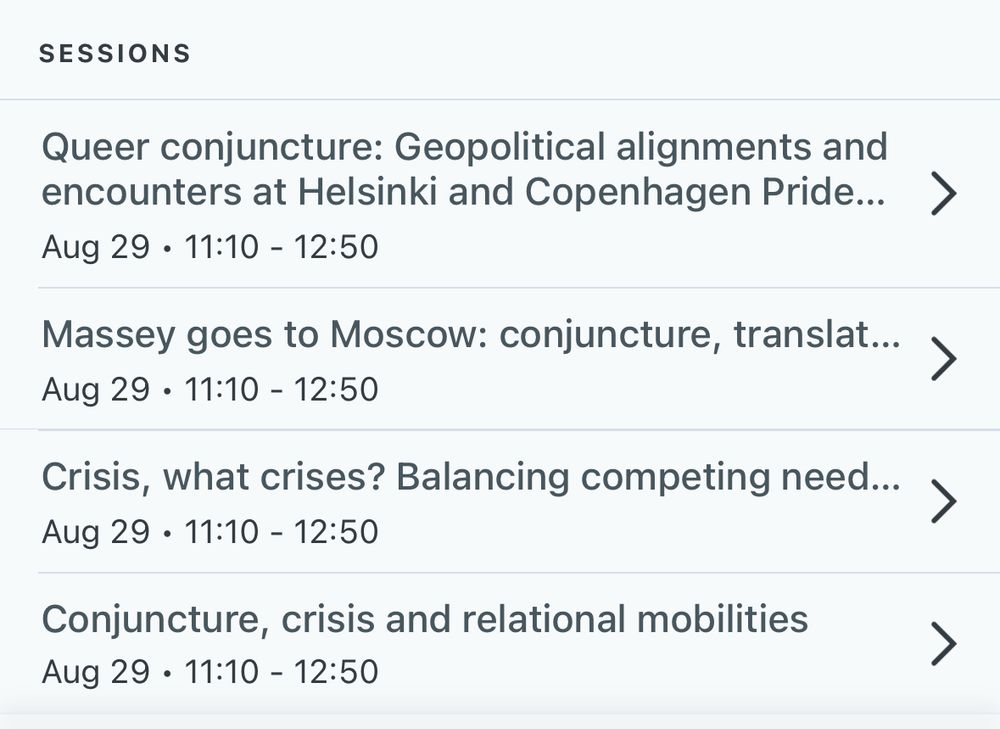
At RGS tomorrow? Come along to our session on Urban Politics, Crises and Conjunctures with @colinlorne.bsky.social @markushesse60.bsky.social @derek-ruez.bsky.social
28.08.2025 07:59 — 👍 4 🔁 5 💬 0 📌 0
🌍Are you attending the RGS-IBG Annual Conference in Birmingham later this month?🌏
🚌You can request free bus travel around Birmingham during the week of the conference - just complete the form below by Sunday 17th August.
Geographers please share!
forms.office.com/pages/respon...
Will be following this to see what other people suggest 👀
14.08.2025 11:24 — 👍 1 🔁 0 💬 0 📌 0
The only reason you assassinate every Al Jazeera journalist left in Gaza is because you don’t want anyone to document the genocide you are about to accelerate.
Any politician and any journalist who cannot call this genocide for what it is, is complicit, and I hope history remembers you as such.
Two days left 👇
13.08.2025 20:14 — 👍 1 🔁 1 💬 0 📌 0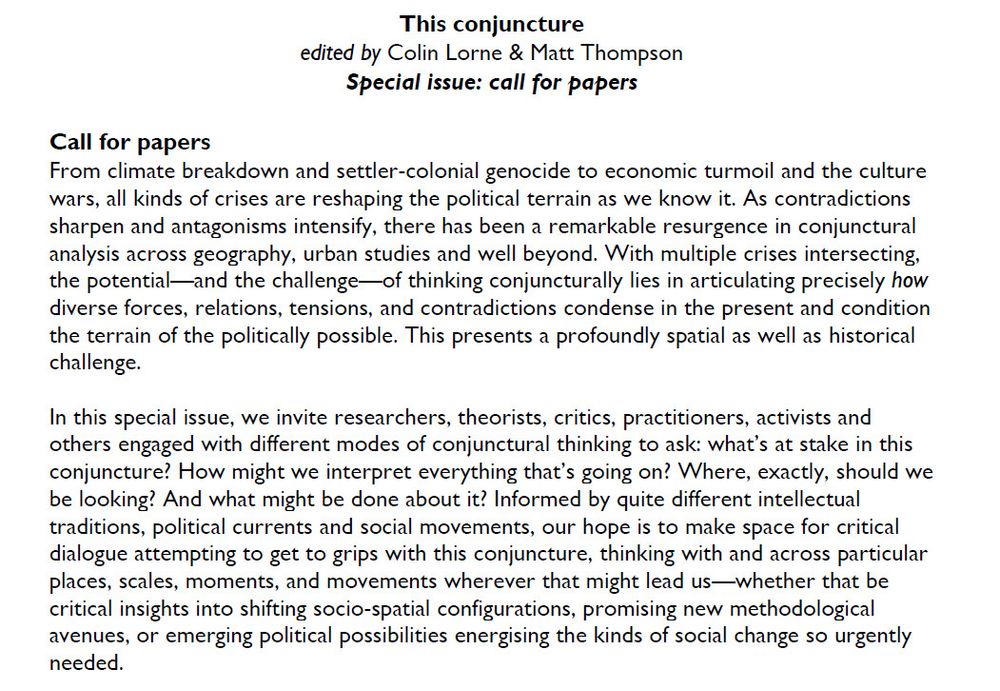
From climate breakdown and settler-colonial genocide to economic turmoil and the culture wars, all kinds of crises are reshaping the political terrain as we know it. As contradictions sharpen and antagonisms intensify, there has been a remarkable resurgence in conjunctural analysis across geography, urban studies and well beyond. With multiple crises intersecting, the potential—and the challenge—of thinking conjuncturally lies in articulating precisely how diverse forces, relations, tensions, and contradictions condense in the present and condition the terrain of the politically possible. This presents a profoundly spatial as well as historical challenge. In this special issue, we invite researchers, theorists, critics, practitioners, activists and others engaged with different modes of conjunctural thinking to ask: what’s at stake in this conjuncture? How might we interpret everything that’s going on? Where, exactly, should we be looking? And what might be done about it? Informed by quite different intellectual traditions, political currents and social movements, our hope is to make space for critical dialogue attempting to get to grips with this conjuncture, thinking with and across particular places, scales, moments, and movements wherever that might lead us—whether that be critical insights into shifting socio-spatial configurations, promising new methodological avenues, or emerging political possibilities energising the kinds of social change so urgently needed.
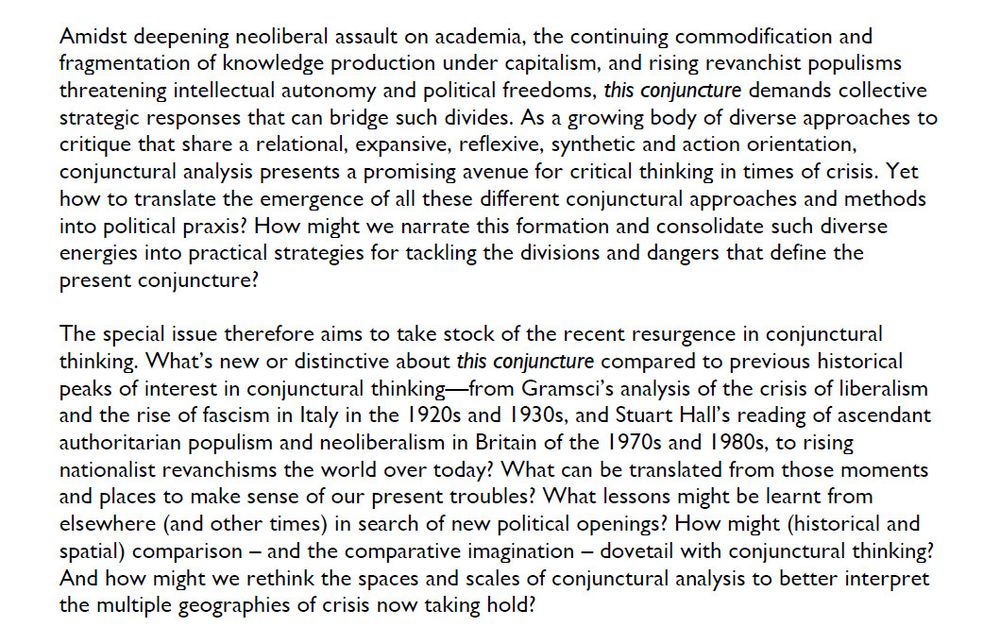
Amidst deepening neoliberal assault on academia, the continuing commodification and fragmentation of knowledge production under capitalism, and rising revanchist populisms threatening intellectual autonomy and political freedoms, this conjuncture demands collective strategic responses that can bridge such divides. As a growing body of diverse approaches to critique that share a relational, expansive, reflexive, synthetic and action orientation, conjunctural analysis presents a promising avenue for critical thinking in times of crisis. Yet how to translate the emergence of all these different conjunctural approaches and methods into political praxis? How might we narrate this formation and consolidate such diverse energies into practical strategies for tackling the divisions and dangers that define the present conjuncture? The special issue therefore aims to take stock of the recent resurgence in conjunctural thinking. What’s new or distinctive about this conjuncture compared to previous historical peaks of interest in conjunctural thinking—from Gramsci’s analysis of the crisis of liberalism and the rise of fascism in Italy in the 1920s and 1930s, and Stuart Hall’s reading of ascendant authoritarian populism and neoliberalism in Britain of the 1970s and 1980s, to rising nationalist revanchisms the world over today? What can be translated from those moments and places to make sense of our present troubles? What lessons might be learnt from elsewhere (and other times) in search of new political openings? How might (historical and spatial) comparison – and the comparative imagination – dovetail with conjunctural thinking? And how might we rethink the spaces and scales of conjunctural analysis to better interpret the multiple geographies of crisis now taking hold?
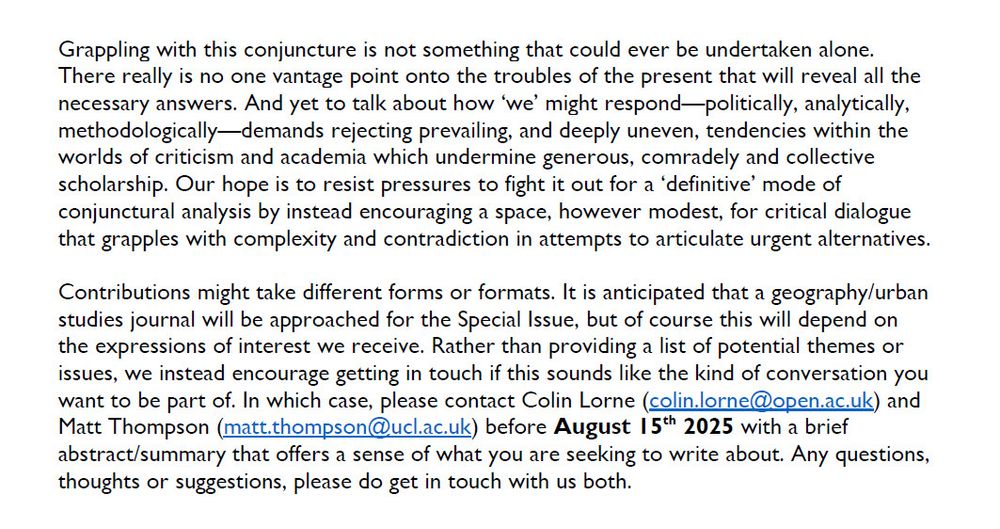
Grappling with this conjuncture is not something that could ever be undertaken alone. There really is no one vantage point onto the troubles of the present that will reveal all the necessary answers. And yet to talk about how ‘we’ might respond—politically, analytically, methodologically—demands rejecting prevailing, and deeply uneven, tendencies within the worlds of criticism and academia which undermine generous, comradely and collective scholarship. Our hope is to resist pressures to fight it out for a ‘definitive’ mode of conjunctural analysis by instead encouraging a space, however modest, for critical dialogue that grapples with complexity and contradiction in attempts to articulate urgent alternatives. Contributions might take different forms or formats. It is anticipated that a geography/urban studies journal will be approached for the Special Issue, but of course this will depend on the expressions of interest we receive. Rather than providing a list of potential themes or issues, we instead encourage getting in touch if this sounds like the kind of conversation you want to be part of. In which case, please contact Colin Lorne (colin.lorne@open.ac.uk) and Matt Thompson (matt.thompson@ucl.ac.uk) before August 15th 2025 with a brief abstract/summary that offers a sense of what you are seeking to write about. Any questions, thoughts or suggestions, please do get in touch with us both.
Still a few weeks left to submit something to this exciting (!) call for a special issue on conjunctural analysis
if you're thinking about the conjuncture, what to do about it politically, and how to write about it strategically and conceptually, we'd love to hear from you!
@colinlorne.bsky.social
We're delighted that you're delighted!
19.07.2025 15:55 — 👍 4 🔁 1 💬 0 📌 0
"Articulating place: towards a conjunctural analysis of public health"—now published in the Journal of Critical Public Health
We examine interest in 'place' as a circulating policy solution to improve health, wealth and wellbeing in this conjuncture:
journalhosting.ucalgary.ca/index.php/jc...
Amazing news: Princeton & its prosecutors pressed charges against 13 students for a pro-Palestine protest, then offered to dismiss charges against 12 if one, @aditilrao.bsky.social, pled guilty.
Instead, everyone held firm, and today the case was DISMISSED WITH PREJUDICE & arrest record expunged!!!
Published version - with alternative introduction - to be published very soon!
08.07.2025 17:09 — 👍 1 🔁 0 💬 0 📌 0You had me at the ...BUT! You have correctly identified that we're obsessed with music not sport!
08.07.2025 17:07 — 👍 0 🔁 0 💬 0 📌 0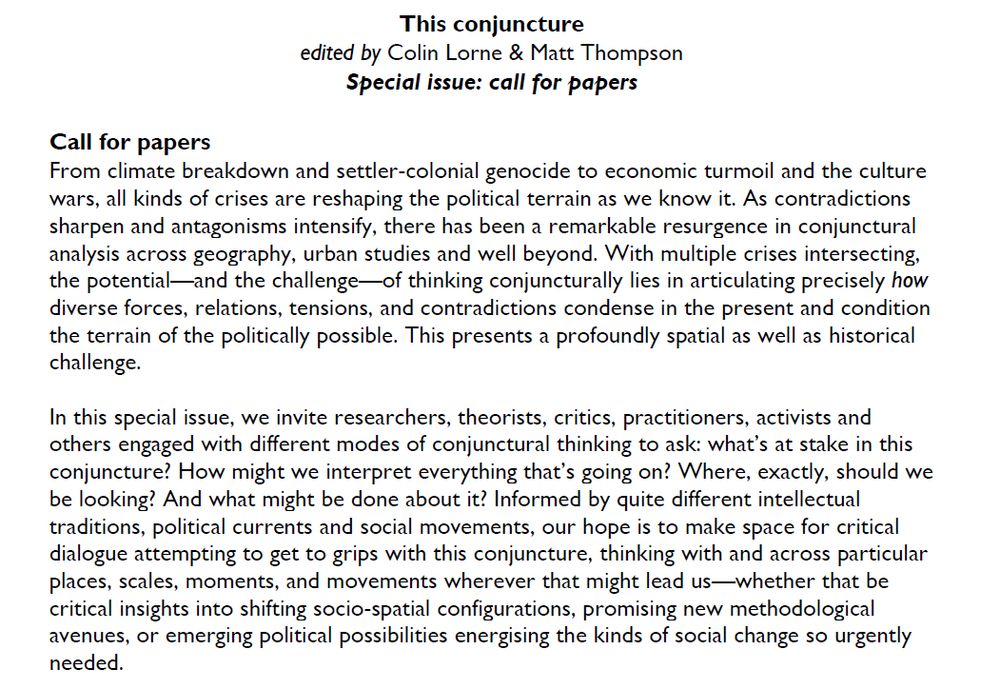
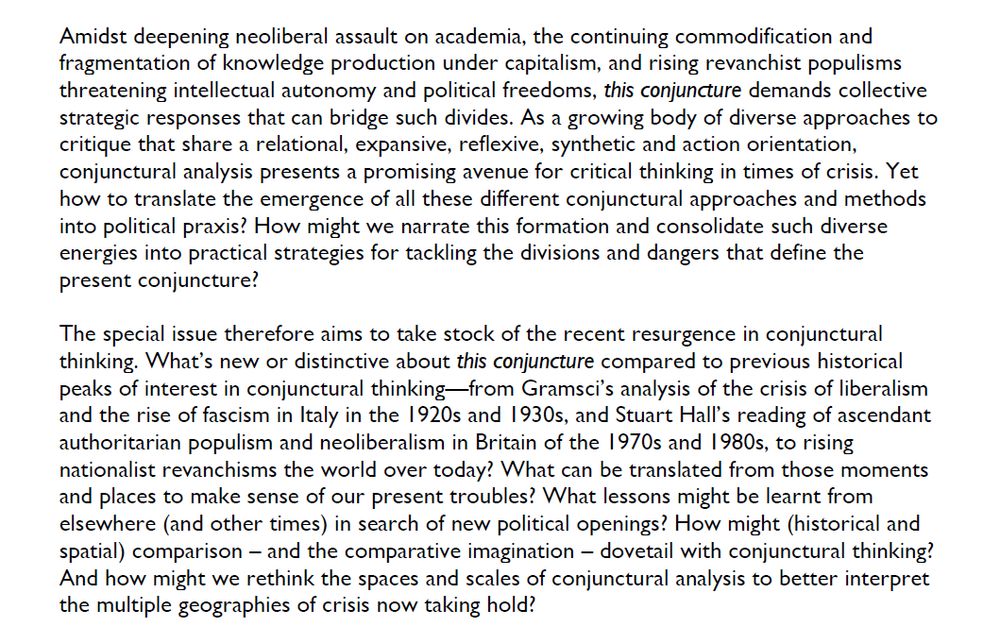
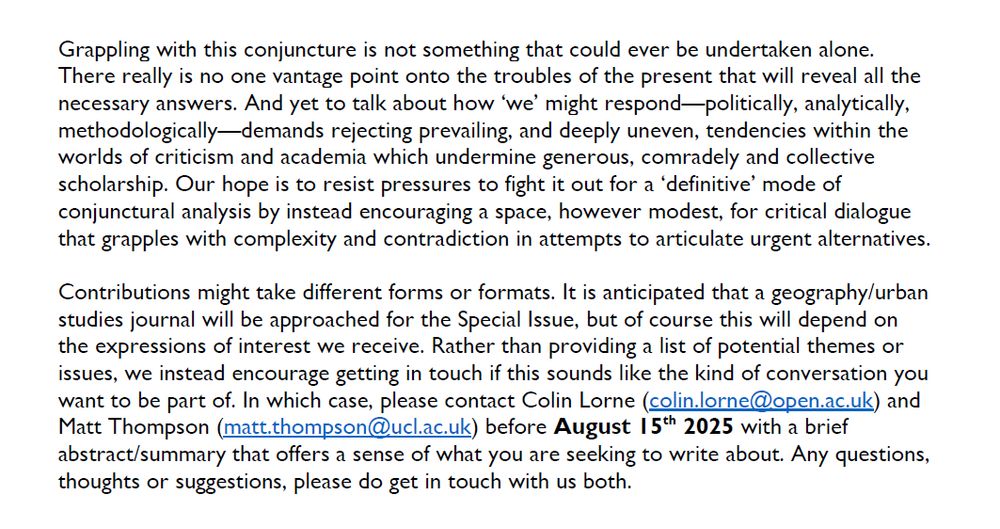
*call for papers* for a special issue on 𝘵𝘩𝘪𝘴 𝘤𝘰𝘯𝘫𝘶𝘯𝘤𝘵𝘶𝘳𝘦
Edited by me and @colinlorne.bsky.social in a geography or urban studies journal yet to be decided
If you're interested in writing about conjunctural thinking and the conjuncture, in any domain or discipline, we'd love to hear from you!
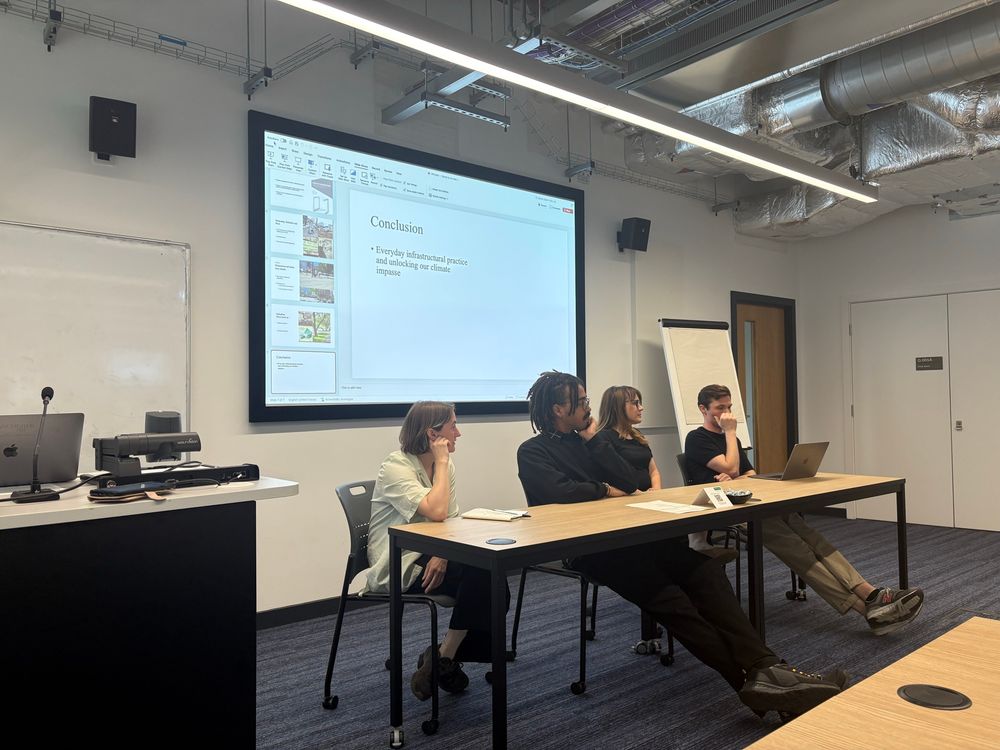
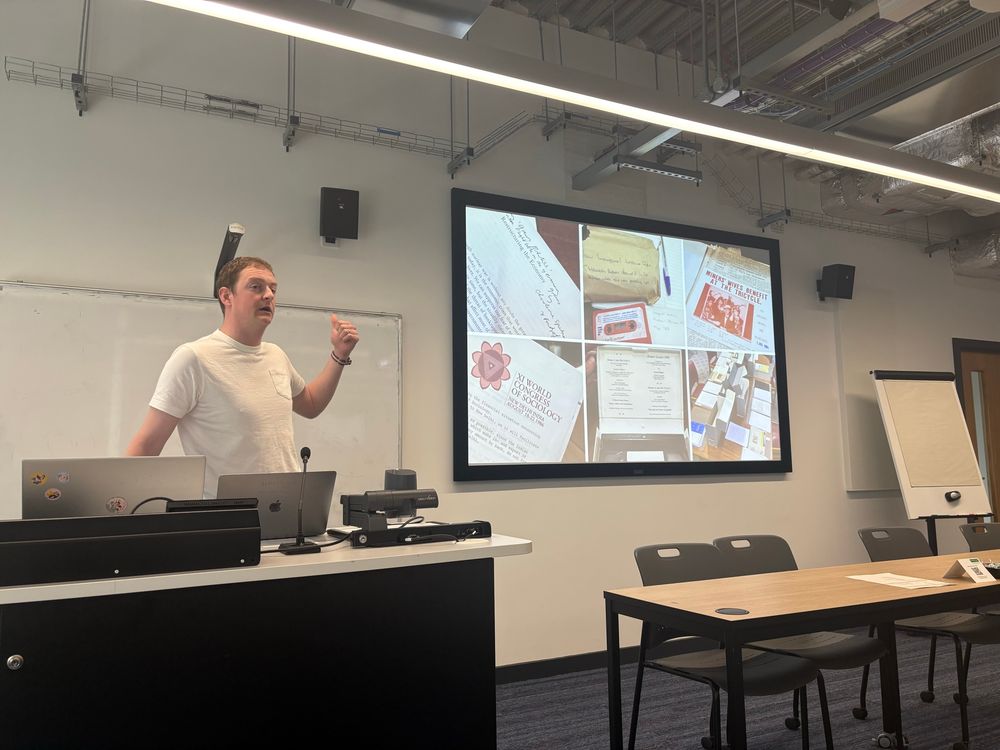
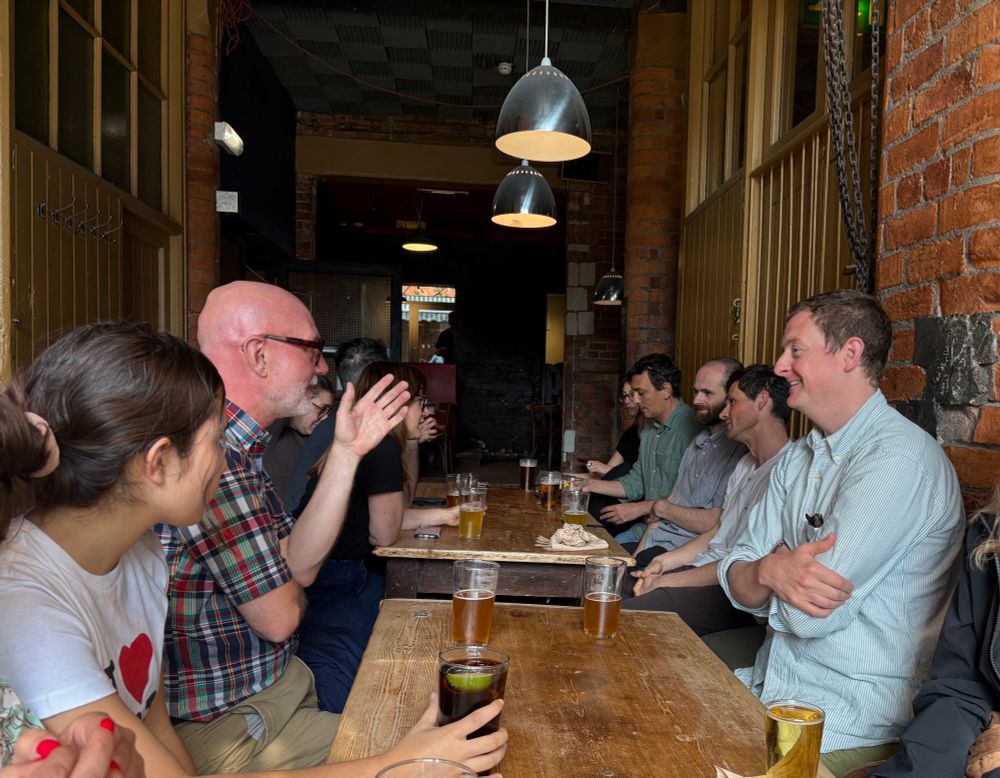
Last week I was pleased to host a workshop on Spatialising Urban Crisis. It highlighted the strategies and challenges of navigating the current conjecture. So great to see and be part of such vibrant conversations! #ukri_flf Thanks to @lorettaclees.bsky.social @colinlorne.bsky.social + all!
30.06.2025 06:18 — 👍 17 🔁 1 💬 1 📌 0We make the case for 'thinking conjuncturally' about place and public health: there is a need to locate the many crises, contradictions and antagonisms conditioning public health in this conjuncture in order to articulate political alternatives and identify possibilities for progressive policymaking
20.06.2025 14:22 — 👍 0 🔁 1 💬 0 📌 0